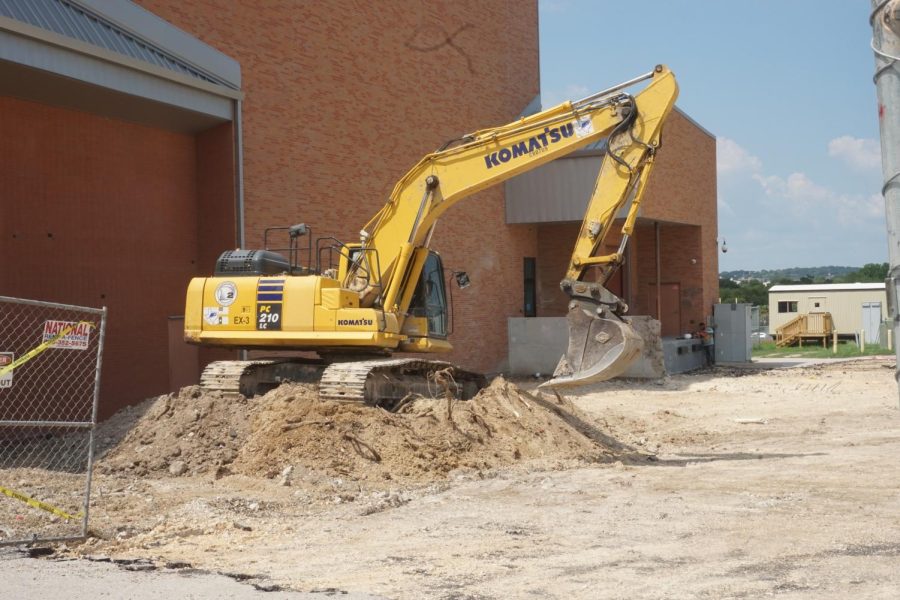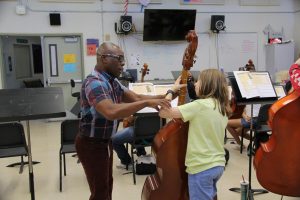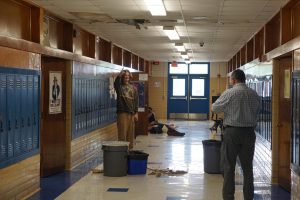Breaking down the bond
McCallum to receive $65 million for modernization if new bond proposal passes, students and faculty reflect on past, present and what the bond means for the future
Construction equipment is now an everyday sight in the former fine arts parking lot. The parking lot was fenced off in August in anticipation of construction for a new dance studio, which is being funded by the 2017 bond.
September 10, 2022
On Aug. 11, the Board of Trustees unanimously voted to increase its original bond proposal package from $1.55 billion to $2.44 billion and add 14 schools, including McCallum, to a modernization list. On election day this November, voters will have the opportunity to give their opinion on the bond and will be the final say on whether or not schools will receive the funding.
The original bond package allocated $30 million for McCallum to address heating and air conditioning deficiencies, security systems and athletic field upgrades, but students and parents were adamant this wasn’t enough. They voiced their concerns through comments on the bond website and letters to the school board.
“When our kids go to other schools for sports they are shocked,” parent Natalie Gray wrote in a comment on a public input forum board. “’Why is their gym so big? How do they get those science labs?’ We see significant and stunning renovation at Murchison and Doss and other places. How does this 1950s campus not fall into the next round of renovations?”
The board listened. With the updated bond, McCallum will receive $65 million to improve building deficiencies, upgrade athletic fields and create a secure entry vestibule. All these changes, along with other general renovations, mean that McCallum will ultimately receive Phase 1 modernization.
“McCallum was built in 1953 and in 1953, education looked very different,” Principal Nicole Griffith said. “We can see how we can bring [the school] up to the 21st century and up to speed with how our students learn now.”
The announcement of McCallum on the list for modernization comes after the campus received a score of 23 on the 2021 Facility Condition Assessment, the lowest in the district after only the barn used to store school buses. On the 2021 Education Sustainability Assessment, McCallum scored a 50, still below the district average. The FCA score changed to 65 because of miscalculations when accounting for replacement costs. This error was made in high schools throughout AISD.
The increase in score did not reflect an increase in campus quality since the initial evaluation. Facility issues have persisted and once again come to light in recent rainstorms. Countless classrooms experienced ceiling leaks, and some, like the ones in graphic design teacher Tim Carroll’s room, seriously impeded student learning and safety.
“I’m working with computers and most of my classes are doing projects on workplace safety so coincidentally it’s illustrated right there for you: rain just pouring on computers, ruining keyboards,” Carroll said. “We don’t have the budget to replace computers so it’s not just a safety issue, my students can’t study the necessary programs.”
View this post on Instagram
Before experiencing difficulties from the rain, Carroll was struggling with 95-degree heat in his room before the school year began.
“I could not prepare the class. I could not set up my projectors and get everything working because of that,” he said.
Carroll was given a portable AC unit, which is keeping his space cool for the time being but is not a permanent fix to the climate issues in his room and in classrooms around campus.
Issues like leaks, air conditioning failure, and electrical problems will be resolved if McCallum receives the $65 million, seeing as they fall under the umbrella of “building deficiencies.” To raise the money, the district’s debt service tax would increase by $0.01 for every $100 that a property is worth, but property tax compression will allow the school board to decrease the overall tax rate by 6.5 cents for the 2022-23 school year, resulting in a net lower tax rate if the bond passes.
“This is an investment into schools and making sure our students have the ability to be successful,” Griffith said.
Most current students and teachers will not experience the benefits of this bond package.
“It does take long,” Griffith said. “We want to be able to do it right, and so that takes being thoughtful about the process and the design and getting input from lots of different stakeholders and listening to not only teachers and students but also families and community members.”
In 2017, the Board of Trustees announced a $1.05 billion bond that gave McCallum $8 million for security and technology upgrades, general planning and a new dance studio. Five years post-bond, the dance studio is just beginning to break ground in the fenced-off fine arts parking lot.
“Be patient, but also be diligent,” Carroll said. “I’m saying that to myself, be patient.”
Students hope that, if passed, the bond will address not only facility issues but also bring more funding to neglected programs and open up new possibilities for the school. Freshman Izzy Bizzell hopes that improvements in athletics could lead to home football games on campus.
“I think home games would be more fun! It’s also close to a lot of people in the area,” she said. “I feel like [it] will bring more spirit.”
Junior Naomi Pearson hopes that as building problems are addressed by bond funding, some of the weight will be taken off the custodial staff, who she has witnessed working as late as 11 p.m. when she stays after school for theater rehearsals.
“It’s not a choice for them,” Pearson said. “They’re staying until crazy hours. Even with that, the floors haven’t been swept and stuff hasn’t been clean, [which] is bad for health reasons, especially with coronavirus and other things going around.”
While many variables concerning the bond are yet to be set in stone, the consensus from school and local community members is that the funding is crucial to the success and future of McCallum.
“It’s imperative that we get our students ready for the next level and we need a facility that allows us to do that,” Griffith said.









Owen Johns • Oct 28, 2022 at 11:24 am
I am very excited to see the effect of the modernization on our school